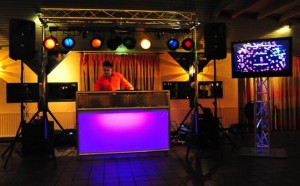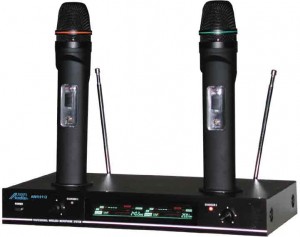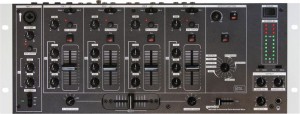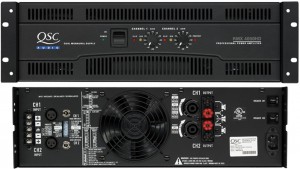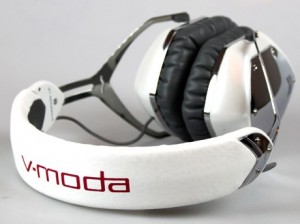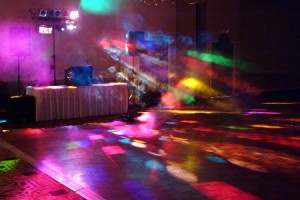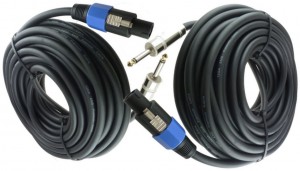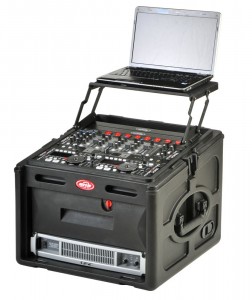By Ben Stowe, CTS - “Sound & Lighting Guru”
I was musing the other day that I should submit to David Letterman a Top 10 list of things aspiring DJs say. I can picture him, armed with pencil and note cards, smiling broadly and saying: “And the #1 thing aspiring DJs say is….. ‘so what do I need to be a DJ’?”
I imagine every DJ or equipment supplier has heard that question, so I’m going to attempt to break it down to the lowest common denominator. The answer can be very subjective, and entire books have been written on the subject. Because DJing is an artistic form of expression and the performances can be as individual as a client, it’s important to note that there are a nearly infinite number of combinations of equipment one might acquire to become a mobile DJ.
Whoa! Equipment? Is that all you need to be a DJ? Of course not. However, equipment alone is subjective and controversial enough for this guy, so that’s all the further I am going to delve into the topic. A great many others have weighed in on the performance and business aspects of DJing. Another clarification is that “need” is talking in terms of absolutes, I’d prefer to say that this article will cover what I “suggest” you use as a mobile DJ.
Media player
It goes without saying that to be a DJ you need music, and we need a way to play that music. Media players can vary greatly in form and function. A media player could be a turntable with vinyl records, or a digital format like a CD player or computer. Many mobile DJs now utilize hardware interfaces for their computer that produce high quality audio while harnessing the power of modern DJ software and computing platforms. Many software solutions allow you to connect turntables or similar devices to achieve vinyl like behavior from a computer, although some purists will argue that there’s no replacement for the sound of vinyl itself.
Microphone
For many DJs, their personality as an MC is as important (if not more) as the music. In many cases it is the defining factor between them and other DJs. I recommend that you unleash the personality… literally. Make it wireless. As with all things wireless, I also recommend having a wired backup. The type of microphone may vary by performer, but as a general recommendation I like a cardioid (hyper or super works too) patterned element. This will give you good off-axis rejection and help prevent unwanted sounds or feedback in high sound-pressure level areas.
Mixer
You’ll want a mixer to “mix” the levels of the music coming from your media player, as well as your microphone. It allows you to create seamless mixes, and also to have exacting control over these levels. A mixer also performs another crucial function in that the level coming from a microphone is a mere millivolts. Mixers have a mic preamp. A preamp does just that… it pre-amplifies the signal before it can be put into the mix.
Loudspeakers
The type, style and quantity of loudspeakers a mobile DJ can use varies greatly. Many DJs have several different configurations of loudspeakers in their inventory, which allows them to properly perform at a variety of events. If you intend to perform at functions aimed at younger crowds you will certainly want to consider having a subwoofer. Full range speakers may be more than adequate for many events, but the deep, powerful low frequency enforcement a subwoofer offers will really enrich your sound and also allow greater output from your “top” boxes.
Amplifier
It’s hard to pinpoint the most important part of a system, and certainly a chain is only as strong as it’s weakest link, but it’s notable how much the quality of an amplifier will affect your overall sound. An amplifier takes the signal from your mixer and increases it to the level necessary to drive your loudspeakers. When using the same speakers, the sound quality difference between a high quality and a low quality amp can be stunning. Some DJs have said, “I will buy powered speakers because I don’t want to have an amp.” That’s not really the case, every loudspeaker needs an amp. A “powered” speaker simply has the amp inside the loudspeaker enclosure. Powered speakers can be very desirable for their simplicity of operation and portability, but I find that a properly powered and processed passive system will often out perform an active one.
Headphones
We’ve covered loudspeakers and amplifiers for your throng of raving fans, but what about for you? I believe it is essential to the ability to mix for you to be able to “cue” music, that is to be able to hear it separately from the main mix going out your loudspeakers. Many DJs have a booth monitor as well, but you’d need a real gift to mix without headphones. Show me a DJ that can, and I’ll show you a DJ that’s a lot better than me.
Lighting
Human beings have five senses, and hearing is only one of them. I believe we should offer something for our eyes too. In fact, our senses work closely together and you will hear things differently based on what your eyes see at the same time. Light shows can vary greatly in size and complexity, but I recommend having something to provide some dancefloor lighting and bring forth another dimension of the music. Consider this, large musical tours often have elaborate light shows, but you are just there to see the artist perform, right? So, why the light show? It’s part of the overall performance, that’s why.
Cables
Let’s review the “weakest link in the chain” analogy. It makes my head spin how often someone will spend thousands of dollars on high quality gear and then connect it with the cheapest cables. Copper is copper, right? Wrong. Cars are all made of steel and plastic, but they are not all made the same. A poor quality cable can cause hours of troubleshooting headaches, poor performance and ultimately sabotage all of the above mentioned equipment. I’m not suggesting you buy cables made of drawn titanium, wrapped in spun gold and sprinkled in unicorn dust. Just use some common sense. A $5 mic cable should be promptly ignored.
Cases
Why spend good money on equipment and then not properly protect it? Why make it difficult to transport? There’s no reason to do either. Cases are a must. A good rack can allow you to keep mixer and media players permanently connected for faster set-up and tear-down at a show, and good cases will greatly extend the appearance and functional life of your equipment.
What Else?
There are legions of other items that can be added to a basic DJ system component set up. This includes things like scrims, facades, stands, truss, and transportation. I also didn’t get into any real specifics on the types of the equipment mentioned above; however, this is a good jumping off point to get you started.
For more information related to this topic, check out my other articles:





